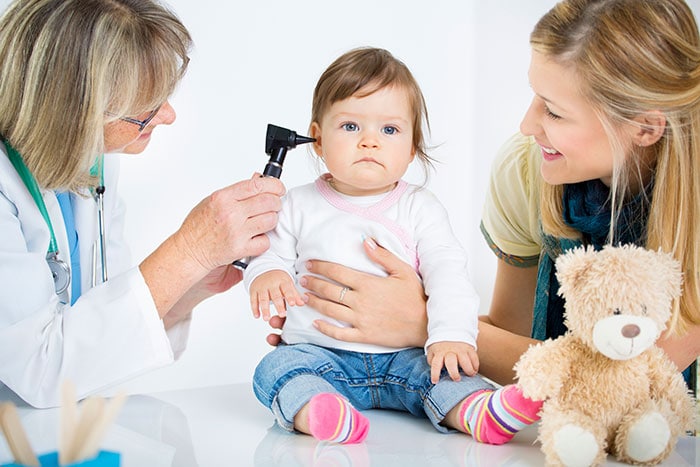Families' Barriers to Obtaining Speech and Language Services for Children
- Helping children learn linguistic communication
- What to do if there are concerns
- Detecting bug
- Treatment
Children are born ready to learn a language, but they need to learn the linguistic communication or languages that their family and environment use. Learning a language takes time, and children vary in how quickly they master milestones in linguistic communication and speech development. Typically developing children may accept trouble with some sounds, words, and sentences while they are learning. Withal, most children can employ language easily around 5 years of age.

Helping children larn language
Parents and caregivers are the most important teachers during a child's early years. Children learn language by listening to others speak and by practicing. Even young babies detect when others repeat and answer to the noises and sounds they brand. Children's language and brain skills become stronger if they hear many different words. Parents can help their child learn in many different ways, such every bit
- Responding to the commencement sounds, gurgles, and gestures a baby makes.
- Repeating what the child says and adding to information technology.
- Talking about the things that a child sees.
- Asking questions and listening to the answers.
- Looking at or reading books.
- Telling stories.
- Singing songs and sharing rhymes.
This can happen both during playtime and during daily routines.
Parents can also observe the following:
- How their child hears and talks and compare it with typical milestones for communication skillsexternal icon.
- How their child reacts to sounds and take their hearing tested if they have concerns.
Learn more almost language milestones. Sentry milestones in activity.
Top of Page
Some languages are visual rather than spoken. American Sign Language uses visual signals, including gestures, facial expressions, and trunk movement to communicate.
What to do if there are concerns
Some children struggle with understanding and speaking and they need assistance. They may non master the language milestones at the same time as other children, and information technology may be a sign of a language or speech delay or disorder.
Language development has different parts, and children might have problems with one or more of the following:
- Understanding what others say (receptive language). This could exist due to
- Non hearing the words (hearing loss).
- Not understanding the meaning of the words.
- Communicating thoughts using language (expressive language). This could exist due to
- Not knowing the words to use.
- Non knowing how to put words together.
- Knowing the words to use just non beingness able to express them.
Language and voice communication disorders can be together or by themselves. Examples of problems with language and speech development include the following:
- Oral communication disorders
- Difficulty with forming specific words or sounds correctly.
- Difficulty with making words or sentences catamenia smoothly, like stuttering or stammering.
- Language delay – the ability to understand and speak develops more slowly than is typical
- Language disorders
- Aphasia (difficulty understanding or speaking parts of language due to a brain injury or how the brain works).
- Auditory processing disorder (difficulty understanding the meaning of the sounds that the ear sends to the brain)
Acquire more most language disordersexternal icon.
Language or speech disorders tin can occur with other learning disorders that impact reading and writing. Children with linguistic communication disorders may experience frustrated that they cannot understand others or brand themselves understood, and they may act out, act helpless, or withdraw. Linguistic communication or speech communication disorders tin can as well be nowadays with emotional or behavioral disorders, such as attention-deficit/hyperactivity disorder (ADHD) or anxiety. Children with developmental disabilities including autism spectrum disorder may likewise take difficulties with speech and language. The combination of challenges can make it especially hard for a kid to succeed in school. Properly diagnosing a child's disorder is crucial so that each child tin can get the right kind of assist.
Top of Folio
Detecting problems with language or speech communication

If a kid has a problem with language or speech development, talk to a healthcare provider virtually an evaluation. An important first pace is to find out if the kid may have a hearing loss. Hearing loss may be difficult to notice especially if a child has hearing loss just in one ear or has partial hearing loss, which ways they tin can hear some sounds but not others. Learn more about hearing loss, screening, evaluation, and treatment.
A linguistic communication development specialist like a speech-language pathologistexternal icon will acquit a conscientious assessment to determine what type of trouble with language or speech the child may have.
Overall, learning more than one linguistic communication does not cause language disorders, but children may not follow exactly the same developmental milestones every bit those who acquire only ane language. Developing the ability to sympathize and speak in two languages depends on how much exercise the child has using both languages, and the kind of practice. If a child who is learning more than ane language has difficulty with language development, conscientious assessment past a specialist who understands development of skills in more than than one language may exist needed.
Top of Page
Treatment for language or speech disorders and delays
Children with language problems often need extra help and special didactics. Voice communication-language pathologists can work direct with children and their parents, caregivers, and teachers.
Having a language or speech delay or disorder can qualify a child for early interventionexternal icon (for children upwardly to 3 years of historic period) and special teaching services (for children aged 3 years and older). Schools can do their own testing for linguistic communication or speech disorders to encounter if a child needs intervention. An evaluation by a healthcare professional is needed if in that location are other concerns well-nigh the child's hearing, behavior, or emotions. Parents, healthcare providers, and the schoolhouse can work together to discover the right referrals and treatment.
What every parent should know
Children with specific learning disabilities, including language or speech disorders, are eligible for special education services or accommodations at schoolhouse under the Individuals with Disabilities in Education Act (Thought)external icon and Section 504external icon, an anti-discrimination police.
Get help from your land'southward Parent Training and Information Centerexternal icon
The office of healthcare providers
Healthcare providers can play an important part in collaborating with schools to help a child with speech or language disorders and delay or other disabilities get the special services they demand. The American University of Pediatrics has created a study that describes the roles that healthcare providers tin can have in helping children with disabilitiesexternal icon, including linguistic communication or spoken communication disorders.
Acme of Page
More than information
CDC Data on Hearing Loss
National Constitute on Deafness and Other Advice Disordersexternal icon
Birth to five: Watch me thriveexternal icon
The American Speech-Language-Hearing Clanexternal icon
Source: https://www.cdc.gov/ncbddd/childdevelopment/language-disorders.html
0 Response to "Families' Barriers to Obtaining Speech and Language Services for Children"
Post a Comment